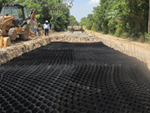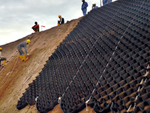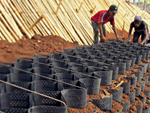| |
| • |
Load Support |
| |
 |
|
Cellular Confinement Systems (CCS) have been used to improve the performance of both paved and unpaved roads by reinforcing the soil in the subgrade-base interface or within the base course. The effective load distribution of CCS creates a strong, stiff cellular mattress. This 3D mattress reduces vertical differential settlement into soft subgrades, improves shear strength, and enhances load-bearing capacity, while reducing the amount of aggregate material required to extend the service life of roads. As a composite system, cellular confinement strengthens the aggregate infill, thereby simultaneously enabling the use of poorly graded inferior material (e.g. local native soils, quarry waste or recycled materials) for infill as well as reducing the structural support layer thickness. Typical load support applications include reinforcement of base and subbase layers in flexible pavements, including: asphalt pavements; unpaved access, service and haul roads; military roads, railway substructure and ballast confinement; working platforms in intermodal ports; airport runways and aprons, permeable pavements; pipeline road support; green parking facilities and emergency access areas. |
| |
| • |
Slope and Channel Protection |
| |
 |
|
The three-dimensional lateral confinement of CCS along with anchoring techniques ensures the long-term stability of slopes using vegetated topsoil, aggregate or concrete surfacing (if exposed to severe mechanical and hydraulic pressures). The enhanced drainage, frictional forces and cell-soil-plant interaction of CCS prevents downslope movement and limits the impact of raindrops, channeling and hydraulic shear stresses. The perforations in the 3D cells allow the passage of water, nutrients and soil organisms. This encourages plant growth and root interlock, which further stabilizes the slope and soil mass, and facilitates landscape rehabilitation. Typical applications include: construction cut and fill slopes and stabilization; road and rail embankments; pipeline stabilization and storage facility berms; quarry and mine site restoration; channel and coastline structures. They can be built as an underlying mass or as a facing. |
| |
| • |
Retaining Wall |
| |
 |
|
CCS provide steep vertical mechanically stabilized earth structures (either gravity or reinforced walls) for steep faces, walls and irregular topography. Construction of CCS earth retention is simplified as each layer is structurally sound thereby providing access for equipment and workers, while eliminating the need for concrete formwork and curing. Local soil can be used for infill when suitable and granular, while the outer faces enable a green or tan fascia of the horizontal terraces/rows utilizing topsoil. Walls also can be used for lining channels and in cases of high flow, it is required that the outer cells contain concrete or cementious slurry infill. CCS have been used to reinforce soft or uneven soil foundations for large area footings, for retaining wall strip footings, for load sharing of covers over pipelines and other geotechnical applications. |
|





